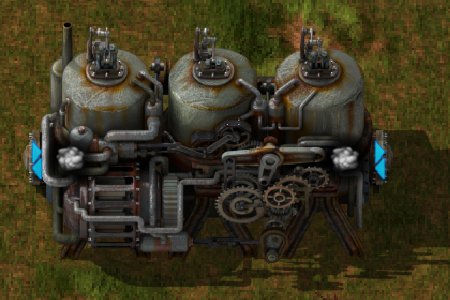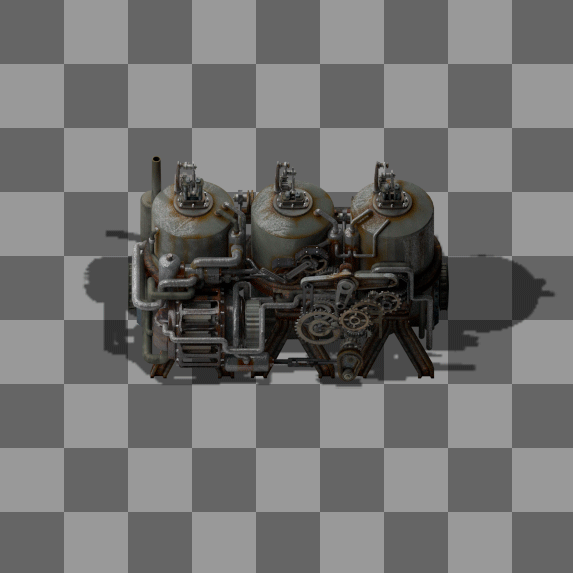Steam engine: Difference between revisions
m (Category overhaul) |
m (Fixes, add gif) |
||
| Line 4: | Line 4: | ||
'''Steam engines''' are the most basic [[Electric system|electricity]] generator, available to the player at the start of the game. They produce [[electricity]] by consuming [[steam]], using [[water]] pumped from an [[offshore pump]] that was heated to 165°C steam with [[Boiler|boilers]] or to 500°C steam with [[heat exchanger]]s. Steam that has a higher temperature than the maximum temperature of the steam engine (165°C) does not yield more electricity, but less steam is consumed. | '''Steam engines''' are the most basic [[Electric system|electricity]] generator, available to the player at the start of the game. They produce [[electricity]] by consuming [[steam]], using [[water]] pumped from an [[offshore pump]] that was heated to 165°C steam with [[Boiler|boilers]] or to 500°C steam with [[heat exchanger]]s. Steam that has a higher temperature than the maximum temperature of the steam engine (165°C) does not yield more electricity, but less steam is consumed. | ||
Steam engines will automatically adjust their power production and steam usage based on the current demands of the electricity network. Hovering the mouse over a steam engine will display their current power production ('''Performance''') and their possible power production ('''Available Performance'''). | Steam engines will automatically adjust their power production and steam usage based on the current demands of the electricity network. Hovering the mouse over a steam engine will display their current power production ('''Performance''') and their possible power production ('''Available Performance'''), in a display on the right. | ||
Steam engines have two ports, allowing excess steam to flow through. This allows steam engines to be chained together. The current optimal ratio is 1 [[offshore pump]] to 20 [[boiler]]s to 40 steam engines. | Steam engines have two ports, allowing excess steam to flow through. This allows steam engines to be chained together. The current optimal ratio is 1 [[offshore pump]] to 20 [[boiler]]s to 40 steam engines. | ||
Using steam engines for power does not produce [[pollution]], unless [[Boiler|boilers]] are used to heat up the water. | Using steam engines for power does not produce [[pollution]], unless [[Boiler|boilers]] are used to heat up the water. | ||
When producing power, the steam engine will display a working animation: | |||
[[File:steam engine animation.gif]] | |||
{{clear}} | |||
== History == | == History == | ||
{{history|0.15.0| | {{history|0.15.0| | ||
* Steam is now internally a separate fluid from hot water. | * [[Steam]] is now internally a separate fluid from hot [[water]]. | ||
* Added high graphics quality option for steam engine. | * Added high graphics quality option for the steam engine. | ||
* Increased the maximum power production of steam engine from 510kW to 900kW | * Increased the maximum [[power production]] of the steam engine from 510kW to 900kW. | ||
* Doubled the heat capacity of water from 0.1kJ per degree per liter to 0.2kJ. | * Doubled the heat capacity of water from 0.1kJ per degree per liter to 0.2kJ. | ||
* Change fluidbox height and base level of boiler, steam engine and pump to improve fluid flow. | * Change fluidbox height and base level of boiler, steam engine and pump to improve fluid flow. | ||
| Line 33: | Line 39: | ||
== See also == | == See also == | ||
* [[Electric | * [[Electric system]] | ||
** [[Power | ** [[Power production]] | ||
* [[ | * [[Steam]] | ||
* [[Pipe]] | |||
{{ProductionNav}} | {{ProductionNav}} | ||
{{C|Energy}} | {{C|Energy}} | ||
Revision as of 18:53, 19 August 2017
| Steam engine |
|
Recipe |
|
| + + + → | |
|
Total raw |
|
| + |
|
Recipe |
|
| + + + → | |
|
Total raw |
|
| + |
|
Map color |
|
|
Fluid storage volume |
200 |
|
Health |
400 |
|
Resistances |
Fire: 0/70% |
|
Stack size |
10 |
|
Dimensions |
3×5 |
|
Power output |
900 kW |
|
Maximum temperature |
165 °C |
|
Fluid consumption |
30/s |
|
Mining time |
0.3 |
|
Prototype type |
|
|
Internal name |
steam-engine |
|
Required technologies |
|
|
None required |
|
|
Produced by |
|
Steam engines are the most basic electricity generator, available to the player at the start of the game. They produce electricity by consuming steam, using water pumped from an offshore pump that was heated to 165°C steam with boilers or to 500°C steam with heat exchangers. Steam that has a higher temperature than the maximum temperature of the steam engine (165°C) does not yield more electricity, but less steam is consumed.
Steam engines will automatically adjust their power production and steam usage based on the current demands of the electricity network. Hovering the mouse over a steam engine will display their current power production (Performance) and their possible power production (Available Performance), in a display on the right.
Steam engines have two ports, allowing excess steam to flow through. This allows steam engines to be chained together. The current optimal ratio is 1 offshore pump to 20 boilers to 40 steam engines.
Using steam engines for power does not produce pollution, unless boilers are used to heat up the water.
When producing power, the steam engine will display a working animation:
History
- 0.15.0:
- Steam is now internally a separate fluid from hot water.
- Added high graphics quality option for the steam engine.
- Increased the maximum power production of the steam engine from 510kW to 900kW.
- Doubled the heat capacity of water from 0.1kJ per degree per liter to 0.2kJ.
- Change fluidbox height and base level of boiler, steam engine and pump to improve fluid flow.
- 0.10.7:
- Made bounding box smaller.
- 0.10.0:
- New graphics.
- New sounds.
- 0.5.1:
- New graphics
- 0.1.0:
- Introduced

